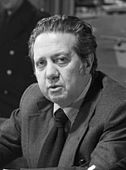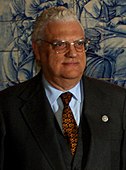Portuguese Constituent Assembly election, 1975
|
|
|||||||||||||||||||||||||||||||||||||||||||||||||||||||||||||||||||||||||||||
|---|---|---|---|---|---|---|---|---|---|---|---|---|---|---|---|---|---|---|---|---|---|---|---|---|---|---|---|---|---|---|---|---|---|---|---|---|---|---|---|---|---|---|---|---|---|---|---|---|---|---|---|---|---|---|---|---|---|---|---|---|---|---|---|---|---|---|---|---|---|---|---|---|---|---|---|---|---|
|
|||||||||||||||||||||||||||||||||||||||||||||||||||||||||||||||||||||||||||||
|
250 seats to the Portuguese Constituent Assembly 125 seats needed for a majority |
|||||||||||||||||||||||||||||||||||||||||||||||||||||||||||||||||||||||||||||
|
|||||||||||||||||||||||||||||||||||||||||||||||||||||||||||||||||||||||||||||
| Portugal |
 This article is part of the series: |
This article is part of the series:
Politics and government of
Portugal
The Portuguese Constituent Assembly election, 1975 was carried out in Portugal on 25 April 1975, exactly one year after the Carnation Revolution. It was the first free election held in Portugal since 1925, and only the seventh free election in all of Portuguese history. Turnout was a record 91.66 percent, which remains (as of 2017) the highest ever in any Portuguese democratic elections (General, Regional, Local or European).
The main aim of the election was the election of a Constituent Assembly, in order to write a new constitution to replace the Estado Novo regime's authoritarian Constitution of 1933 and so this freely-elected parliament had a single-year mandate and no government was based on parliamentary support; the country continued to be governed by a military-civilian provisional administration during the deliberations of the Constituent Assembly.
The election was, perhaps surprisingly, won by the Socialist Party. The Social Democratic Party was the second-most voted party, defending a project that it would soon abandon, social democratic centrism, the Portuguese "Social-Democracy" becoming the major right-wing party in the country a few years after. The parliament had a large majority of parties defending socialist or "democratic socialist" ideas and the Constitution, approved one year after, reflected such influence. The Portuguese Communist Party achieved a surprisingly total, considering the overwhelming support in the south of the country and the radical turn to the left of the revolutionary process after the failed fascist coup, one month before.
With the PSD's shift away from the left and towards the right coming after this election, the only right-of-centre party elected was the CDS, which received 7.6 percent of the vote and 16 seats.
...
Wikipedia





